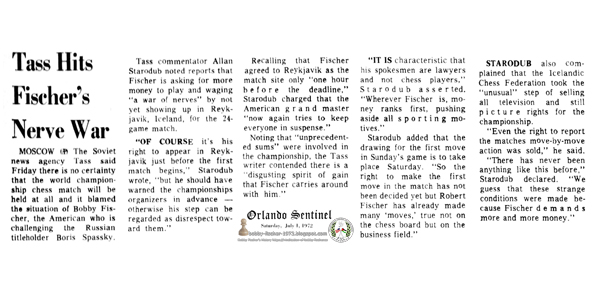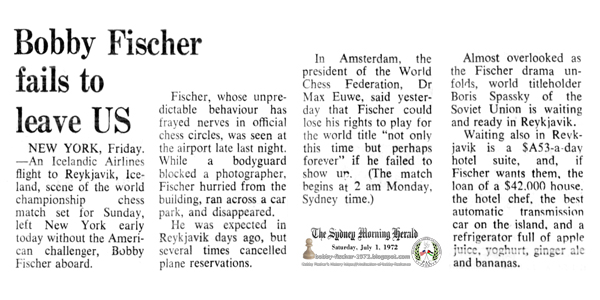New York Times, New York, New York, Saturday, July 01, 1972 - Page 01
Chess World Argues Fischer's Actions by Martin Arnold
Bobby Fischer's posture toward the world chess championship has touched off a wave of debate and discussion in New York and Moscow as well as Reykjavik, Iceland, where his match with the defending Soviet champion, Boris Spassky, is scheduled to open tomorrow.
Tass, the Soviet press agency, said Fischer was motivated by “a disgusting spirit of gain.” ([No more than Soviet system subsidizing its athletes to unfairly monopolize world titles to promote the mythical idea of the Soviet's almost hitleresque “Übermensch”…])
“Whenever the matter concerns Fischer, money comes first while sports motives are relegated to the background,” the agency asserted. ([Ditto!]) “Characteristically, his confidants are not chess players, but lawyers to whom he entrusted all his chess affairs.” ([The Soviet thru coercion of FIDE officials gave Fischer an ultimatum to agree to a contract, he had neither read nor knew the particulars of its contents, forced to agree blindly, or forfeit his rights to challenge for the title. Apparently, Fischer did not consult enough legal advise, as that loaded contract was devised to set off a chain of events which led to Fischer being hounded with a 3.3 million dollar lawsuit by Fox inc years after the match.])
Col. Edmund Edmondson, executive director of the United States Chess Federation, said he did not think anyone would know until game time if Fischer would play.
“He's putting on some kind of an act—for what I don't know,” Colonel Edmondson said, adding that he thought the odds were 2 to 1 that he would not play.
In Iceland, many people seemed to be outraged by Fischer's actions, while others passed the time spreading rumors.
The two most popular rumors were that he had arrived in the country about a week ago on a United States Air Force jet and was in hiding and that he had arrived, also about a week ago, in a Navy submarine, had been smuggled ashore in a rubber dinghy, and was in hiding.
What is known is that one of his lawyers, Andrew Davis, is in Iceland conferring with that nation's chess officials, that some of his best friends are also in the country and that yesterday the 29-year-old international grand master told other friends that he would probably be on the plane for Reykjavik tonight.
His actions Thursday night at Kennedy International Airport were the latest in a series of occurrences since the agreements were signed for the chess championship in March.
On Thursday, Fischer arrived at the airport at about 11 P.M. with Mr. Davis to catch an Icelandic Airlines flight.
Both Flee Newsmen
What had happened is that reporters and photographers spotted Fischer in an airport restaurant Thursday at about 11 P.M. Both he and Mr. Davis ran away, but the lawyer finally got on the plane, which took off at 1:30 A.M. yesterday.
Fischer disappeared in Queens, which was somewhat of a shock, but not entirely a surprise, to his associates. Said one yesterday, “I wouldn't be happy until he actually makes his first chess move in Iceland, and even then it would only be a 90 per cent chance that all would go well.”
Fischer is a member of the Protestant fundamentalist Church of God, a religious group that observes the Sabbath on Saturdays. Because of this, he will not play chess or travel between sundowns on Friday and Saturday. This means that to arrive in Iceland in time to start the tournament, he must take either the 7:30 P.M. or 9:30 P.M. Icelandic flights tonight, if he is to fly direct.
On Wednesday night, Fischer also canceled an airline flight, this on Pan American World Airways, two hour before flight time. Ever since the match was set, Fischer has been on and off about it, and much of his ambivalence has stemmed, some believe, from money disputes.
The winner of the match, if it takes place, is to receive five-eighths of the $125,000 prize money and the loser the remainder—making this the best-paid chess tournament in history.
But Fischer has been balking. Although he has been given 30 per cent (about $70,000) of the television rights, according to Max Euwe, the president of the World Chess Federation, he is said to want 30 per cent of the gate receipts.
Yesterday, Fischer was reported to have finally realized that if he did not appear to play tomorrow the match would be canceled. He also was reportedly told that no more money would be forthcoming.
His problem now, according to those who are close to international chess, is to find a graceful way to back down from his added demands.
“If he doesn't show up, he'll lose his rights to play in the world championship,” Mr. Euwe said. “It won't be my decision alone, but the rules of the game.”
It is also possible, chess sources said, that if he fails to appear this time, he will never get a chance at the world championship again.
Chess experts have still another theory—that Fischer is conducting a war of nerves against Spassky, who is reported to “be on edge already.”
Those who believe this, point to a Fischer quote of some years ago, when the young chess prodigy said of his opponents, “I like to see them squirm.”
New York Times, New York, New York, Saturday, July 01, 1972 - Page 8
Conferences in Iceland by Harold C. Schonberg
NYTimes. Reykjavik, Iceland, June 30—Mr. Davis arrived here this morning and immediately disappeared into a series of conferences with officials of the Icelandic Chess Federation and Fred Cramer of Milwaukee, Fischer's representative here. None of the participants was available for comment.
If Fischer arrives on Sunday morning, after an all-night flight, the chances are that he will be in no physical condition to play a game at 5 P.M.
Under the provisions of the 24-game match, which could last two months, he is entitled to three postponed games for reasons of health if he can supply a medical certificate. Most likely, Fischer will take advantage of that provision, thus putting the start of the match off to Tuesday, Thursday or even next Sunday.
What the Russians think of this, nobody knows. Spassky and his entourage of three companions keep very much to themselves. They are affable, but they do not appear in public much, and they never speak to the press except at a full-scale news conference. So far they have been models of decorum, raising no objections and showing no temperament.
It was learned from a private source, however, that the Russians believe Fischer is acting the way he does because he feels the match will be difficult.
“Of course,” the source said, “Spassky does not show it, but he is also nervous.”
Tonight, an imposing ceremony is being held at the National Theater to inaugurate the chess match. The President of Iceland, the Lord Mayor of Reykjavik, and the Russian Ambassador are among those scheduled to speak.
(CAPTION) Sports Hall Tour: Boris Spassky, center, checking lighting in Reykjavik hall where chess tournament is to be held. With him are Gudmunder Thorarinsson, president of the Icelandic Chess Federation, left, and Fridrik Olafsson, an Icelandic grand master.
New York Times, New York, New York, Saturday, July 01, 1972 - Page 20
Chess Puzzle
Two theories have been put forward to explain Bobby Fischer's erratic behavior on the eve of the scheduled beginning tomorrow of his world championship match against Boris Spassky in Reykjavik. One view is that he is simply acting out an old chess tradition, waging psychological warfare against Spassky, creating uncertainties and tensions for the Soviet titleholder that he hopes will weaken Spassky's play when the battle actually begins. The second theory is that Fischer has become unduly money-conscious after a lifetime of relative poverty, and really may endanger the Reykjavik match and his chance for the title by insisting upon a greater financial return than he had originally agreed to accept.
([Third theory (not offered by NY Times): What Fischer actually ended up doing with the money. He gave most of the prize money away to the cult. It was “urgent urgency,” the church “needed” it, doomsday alarms and all. What Bobby didn't give, Stanley Rader, stepping in to act as Fischer's lawyer, took. Bobby reported in 1976 he was left with nothing but a few assets.])
Whatever Fischer's motives, his failure to show up in Reykjavik and his belated demand for a share of the gate receipts have projected a less than desirable image to the worldwide public fascinated by the title contest. Predictably the Soviet press has begun denouncing Bobby as some sort of money-hungry monster — neglecting to mention, of course, that Fischer and other American chess stars must live by their own earnings and are not subsidized by their government as are Soviet sportsmen.
Nevertheless if Bobby Fischer is creating the present chaos for monetary reasons, he is making a mistake from his own point of view. He may lose the chance to win the world championship, and that chance may never return. If he plays in Reykjavik and wins—as he has an excellent chance of doing—his prospective earnings would make the amount he is arguing about now seem infinitesimal. For his own sake—as well as for the sake of chess—Bobby Fischer ought to get on the first plane, fly to Reykjavik and settle down to playing the best chess of his life.
The Central New Jersey Home News, New Brunswick, New Jersey, Saturday, July 01, 1972 - Page 1
Progress Seen in Negotiations For Fischer Chess Matches
Reykjavik, Iceland (AP) — Considerable progress was reported Friday night in 11th hour negotiations over Bobby Fischer's demand for more money from the world chess championship with Boris Spassky of Russia.
Officials of the sponsoring Icelandic Chess Federation met with Andrew Davis. Fischer's lawyer and confidant, but said there was still no guarantee that the 29-year-old American would show up. The 24-game match starts Sunday.
Meanwhile, Fischer missed a flight Friday to Reykjavik. He booked a reservation and checked his baggage, but after holding the plane up for two hours demanded his luggage back and disappeared from New York's Kennedy International Airport.
This apparently leaves only one flight late tonight which would put Fischer in Reykjavik in time for the start of the match.
Fischer's faith, the Church of God, observes Saturday as the Sabbath and Fischer will not fly between sundown Friday and sundown Saturday.
The financial dispute with the Icelandic Chess Federation involves Fischer's demand for 30 per cent of the gate receipts at the 2,500 Sports Palace where the matches will be held. Tickets are $5 apiece.
A federation spokesman said Davis was seeking a compromise over the money snarl.
But Gutmunder Thorarinsson, ICF president who talked with Fischer's representatives in the United States for much of Friday night, said later that “nothing had been settled.”
By previous agreement, Fischer and Spassky are to divide the $125,000 purse, with the winner getting five-eighths, and receiving 30 per cent of the sales of television and film rights.
The Soviet news agency Tass blamed the uncertain condition on Fischer and said, “Wherever Fischer is, money ranks first, pushing aside all sporting motives.” ([Spoken in the true spirit of the overly ambitious Soviet empire that subsidizes its players, to achieve total monopoly, by unfair advantage, on all world sports titles to prove its “superiority,” reinforcing an illusion on the Russian people, of an almost Hitleresque “Übermensch” quality, or as they say, “It takes one, to know one.”.])
Caption: “ANGRY FISCHER— An angry Bobby Fischer rushes past admirers and away from newsmen at Kennedy Airport last night. Fischer held a reservation for a flight to Reykjavik, Iceland, but missed the flight.”
Journal and Courier Lafayette, Indiana Saturday, July 01, 1972 - Page 13
Fischer Hasn't Moved Toward Chess Match by Stephens Broening
Reykjavik, Iceland (AP) — Organizers of the world chess championship were unable today to report any break-through in their deadlock over money with Bobby Fischer.
On the eve of Fischer's scheduled challenge match with world champion Boris Spassky of Russia, officials of the Icelandic Chess Federation said they still had no assurances that Fischer would appear.
Almost at the last minute the 29-year-old American grand master sent word that he wouldn't play Spassky in Iceland unless a new condition was met: 30 per cent of the gate receipts for the 24 games in addition to a share of a $125,000 purse and a piece of television and film income already contracted for.
Chess Federation officials met until nearly midnight with Andrew Davis, Fischer's friend and attorney, who arrived Friday to negotiate for his client.
The 25-game match is supposed to start Sunday.
Meanwhile, Fischer missed a flight to Reykjavik. He booked a reservation and checked his baggage, but after holding the plane up for two hours demanded his luggage back and disappeared from New York's Kennedy International Airport.
This apparently leaves only one flight late tonight which would put Fischer in Reykjavik in time for the start of the match.
Fischer's faith, the Church of God, observes Saturday as the Sabbath and Fischer ill not fly between sundown Friday and sundown Saturday.
The financial dispute with the Icelandic Chess Federation involves Fischer's demand for 30 per cent of the gate receipts at the 2,500 Sports Palace where the matches will be held. Tickets are $5 apiece.
A federation spokesman said Davis was seeking a compromise over the money snarl.
But Gutmunder Thorarisson, ICF president who talked with Fischer's representatives in the United States for much of Friday night, said later that “nothing had been settled.”
By previous agreement, Fischer and Spassky are to divide the $125,000 purse, with the winner getting five-eighths, and receiving 30 per cent of the sales of television and film rights.
The Soviet news agency Tass blamed the uncertain conditions on Fischer and said, “Wherever Fischer is, money ranks first, pushing aside all sporting motives.”
Tass accused the American challenger of disrespect to the championship organizers by not telling them that he might arrive just before the match begins.
The Sydney Morning Herald Sydney, New South Wales, Australia Saturday, July 01, 1972 - Page 7
Bobby Fischer at the Summit by Al Horowitz
The author of this article has been playing chess for 59 years, since he was six years old. He was a member of the US world chess championship team in 1931, 1935 and 1937, and was a US open champion three times. From 1933 to 1969 he was editor and publisher of “Chess Review.” He is at present chess editor of “The New York Times.”
(CAPTION: Bobby Fischer looks up from a lapful of chess magazines to answer an interviewer.)
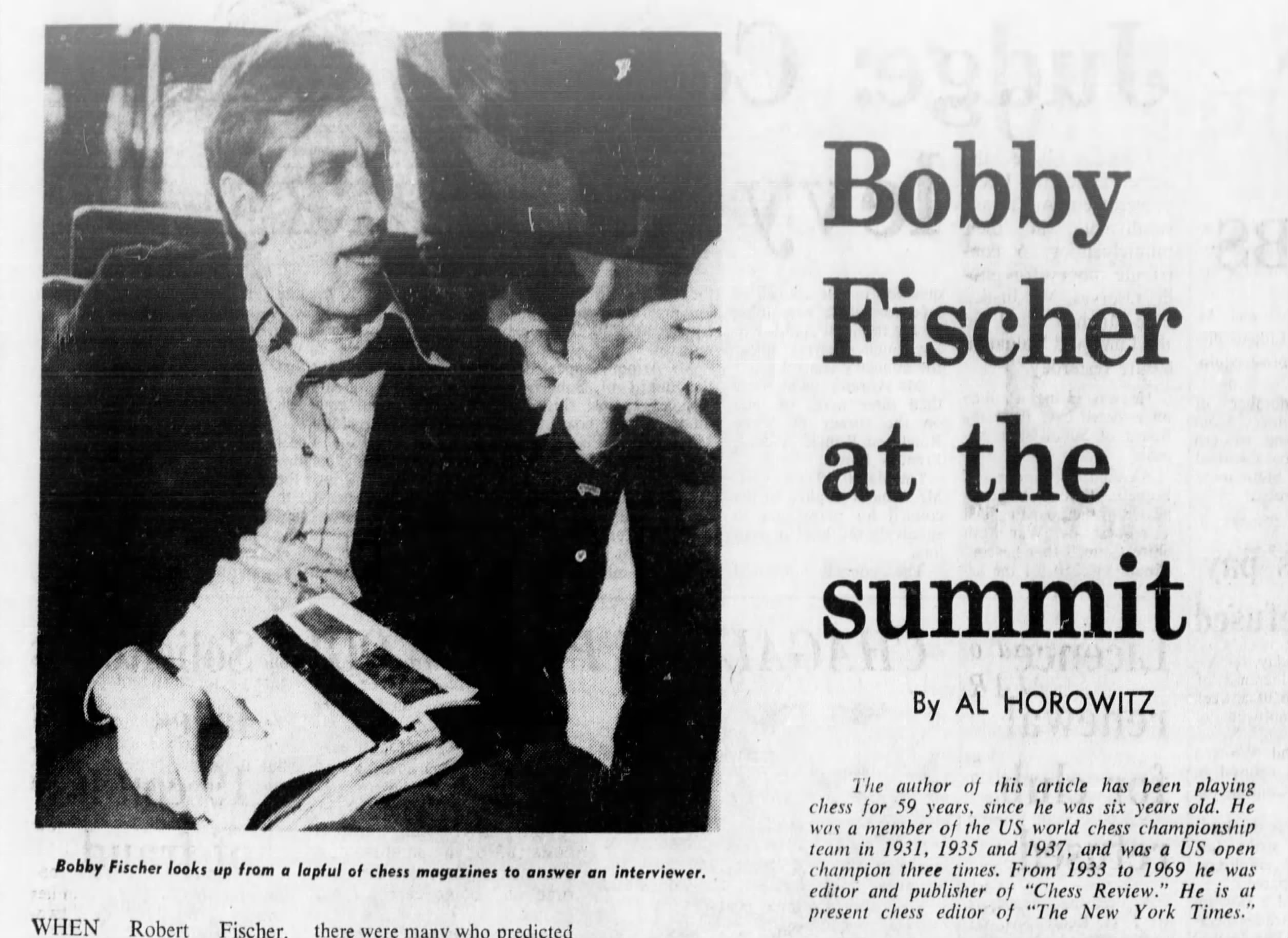 Bobby Fischer at the Summit 01 Jul 1972, Sat The Sydney Morning Herald (Sydney, New South Wales, Australia) Newspapers.com
Bobby Fischer at the Summit 01 Jul 1972, Sat The Sydney Morning Herald (Sydney, New South Wales, Australia) Newspapers.com
When Robert Fischer, many times United States chess champion, sits down to play the first game of his world championship match against titleholder Boris Spassky, of the Soviet Union, in Reykjavik, Iceland, on Monday, it will be the first time in 71 years that an American has participated in a face-to-face match for the highest title.
No American has faced a reigning world champion in a direct confrontation for the title since Frank J. Marshall suffered a humiliating defeat by Emmanuel Lasker in 1901.
Those 71 years represent a long period of hope and frustration for American chess fans; and it is little wonder that, now, when a fellow countryman is to play for the title, and is regarded a heavy favourite as well, they should await the event in a fever of enthusiasm.
Many American chess players have followed Fischer's career from the time when, at the age of 12, he first proved himself a force to be reckoned with. When two years later, in 1956, he won the US championship for the first time, there were many who predicted that he would win the world title before he was old enough to vote.
But although he went on to become, at 15, the youngest grandmaster in the history of the game, the road to the summit proved to be much longer and rockier than his admirers had expected.
That road has now led to, of all improbable places, Reykjavik, where play, barring accidents, will begin early Monday morning, Sydney time. The first player to score 12½ points (counting one point for a win, half-a-point to each for a draw) within the limit of 24 games will win. If the match is tied at the end of 24 games the champion will retain his title.
Spassky was also a world championship contender while still in his teens, but, like Fischer, he suffered some sobering setbacks before finally achieving his goal. He should now be at the height of his career, and in ordinary circumstances might be expected to hold on to his crown for many years to come.
However, it is the firm opinion, not only of most American experts, but of knowledgeable people all over the world, that the world champion is a decided underdog.
The International Chess Federation president, Dr. Max Euwe, himself a former world champion, some months ago was quoted as saying that Fischer has a “60 per cent chance” to win the title—mighty long odds in favor of the challenger. Other prognosticators have echoed Dr. Euwe's view.
On what, one may reasonably ask, do the authorities base such an sanguine view of Fischer's chances? Certainly not on previous games between these two opponents: the score stands 3-0 in Spassky's favor, with two draws.
A careful examination of these games, however, reveals a different picture. Their first meeting, at Mar del Plata, Argentina, in 1960, when Fischer was only 16, resulted in a wild battle in which Bobby had a winning advantage, but went astray in the complications of the play and lost.
Spassky's second win came in 1966, when Fischer made a mistake in an even position and then succumbed to a brilliant attack. And when Spassky again beat Fischer at the Chess Olympics—a team event—at Siegen, East Germany, in 1970, it was largely because, with the American team losing to the Russians, Fischer tried too hard and finally overextended himself.
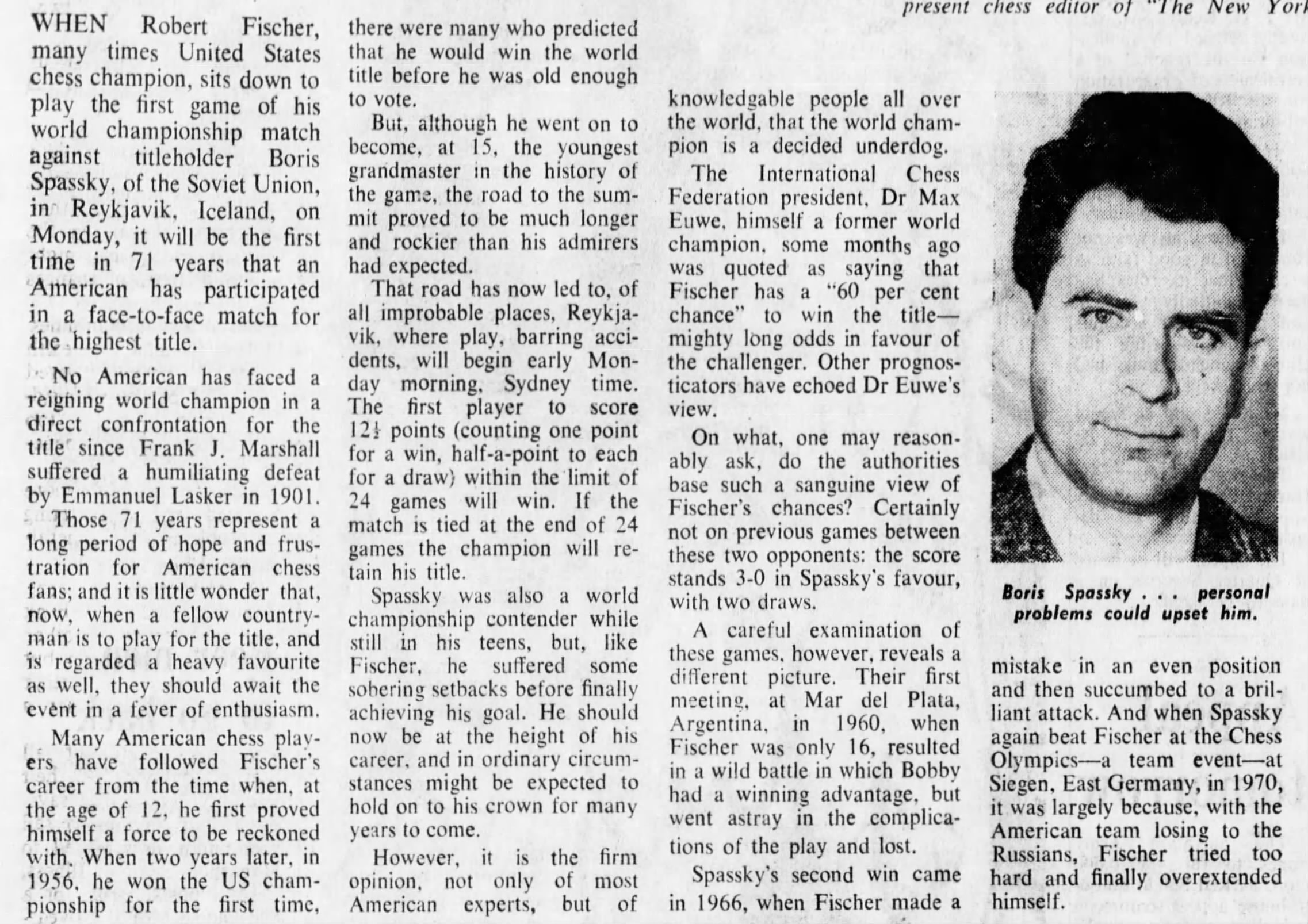 Bobby Fischer at the Summit 01 Jul 1972, Sat The Sydney Morning Herald (Sydney, New South Wales, Australia) Newspapers.com
Bobby Fischer at the Summit 01 Jul 1972, Sat The Sydney Morning Herald (Sydney, New South Wales, Australia) Newspapers.com
Fischer ponders the board before his semi-final match in the world championships at Buenos Aires last year where he demolished former world champion Tigran Petrosian.
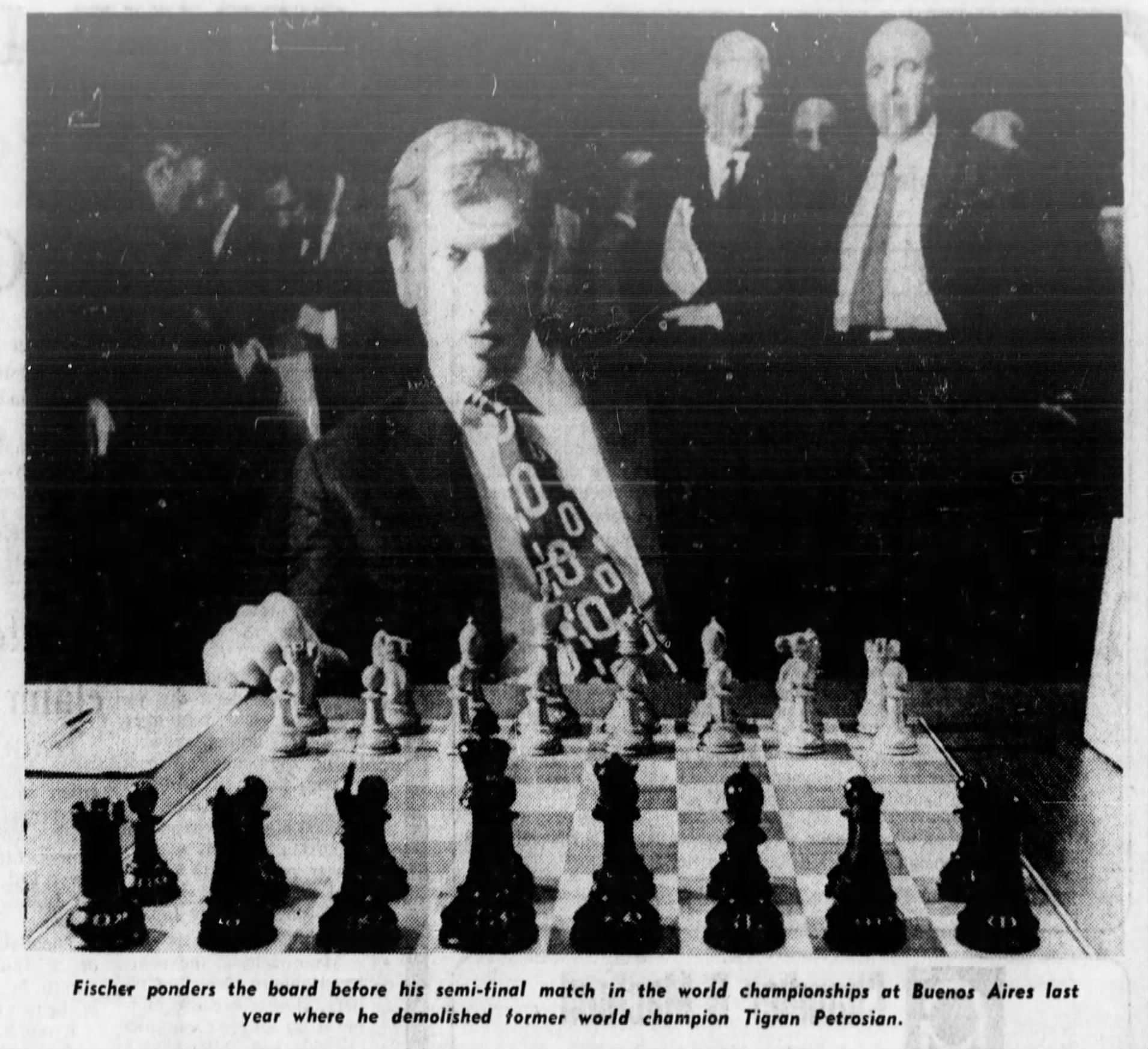 Fischer Ponders the Board 01 Jul 1972, Sat The Sydney Morning Herald (Sydney, New South Wales, Australia) Newspapers.com
Fischer Ponders the Board 01 Jul 1972, Sat The Sydney Morning Herald (Sydney, New South Wales, Australia) Newspapers.com
Surely Spassky's three wins against Fischer without a loss cannot be simply dismissed with a few glib explanations, but close analysis does indicate that their meetings have not been one-sided.
What the experts are basing their opinions on, and rightly so, are the performances of the two protagonists over the past few years. There Fischer has a big edge.
In order to win the right to contend for the championship, Fischer had to win a series of candidates matches against some of the strongest players in the world, and he did so in extraordinary fashion.
First he defeated the Russian grandmaster Mark Taimanov, in a match held in Vancouver, Canada, last May, by an incredible 6-0; unprecedented in this form of competition. Then, in August, at Denver, Colorado, he defeated Bent Larsen of Denmark, widely thought to be the top player of the Western world (after Fischer of course), by the same margin.
And then, to top it off, he disposed of the former world champion Petrosian in a match player last November in Buenos Aires, by 6½-2½.
Meanwhile, Spassky, since winning the title, has had a series of indifferent results. His most recent appearance in a major event was in a tournament in Moscow late last year, when he tied for sixth place—by no means disgraceful in such strong company, but pallid by comparison with Fischer's feats.
Indicative of a player's recent results is the numerical ranking system devised by Professor Arpad Elo, of Marquette University, long used in the US and recently adopted by the International Chess Federation. This system employs a complicated formula to translate tournament and match performances into a four-digit number, and can be employed to predict future results as well.
Spassky's rating is a healthy 2,690 — anything over 2,500 indicates play at the grandmaster level. Fischer's, however, is 2,824 — by far the highest achieved — and enough to make the soberest statician stand up and dance a jig.
Thus, the mathematical projections indicate that Fischer will have an easy time of it, and suggest that the final score will be about 12½-8½ in his favor. This is another way to express Dr. Euwe's opinion—arrived at presumably by intuition—that Fischer has approximately a 6-4 edge.
Chess matches, of course, are not won by reference to probability tables, but over the board.
Fischer is Spassky's superior both technically — his play exhibits fewer weak spots — and temperamentally — Spassky has been having personal troubles recently that have markedly affected his concentration, whereas Fischer's whole life is devoted to chess.
With the qualification that a player who has once won the world championship is of course capable of beating anyone, anytime, the conclusion is inevitable: Fischer will win, and most likely win big.
Fischer is capable of every type of chess—modern, hypermodern and eclectic. In these branches, control of the center is paramount, although hypermodern chess, paradoxically, cedes the center to the antagonist.
All grandmasters agree that it is important to gain control of the center, yet the hypermodernist actually inveigles his opponent into taking control of this area. Why?
In the beginning, plans of this player are long-termed. And, he cedes and bequeaths the center. As play progresses, the hypermodernist's efforts are to retrieve the median area, and every effort is bent on its repossession.
Once regained, the hypermodernist intends to hold on and never to part with it. It goes without saying that the more knowledgeable a player, the great his choice and also the great technician, the finer the play. These are Fischer's attributes. He is confident—and confidence wins games.
Allied with the will to win, it sparks the mental ignition, brings forth ideas, dispels doubts, promotes clear thinking. In contrast, timidity befuddles, inhibits and defeats itself.
Be that as it may, someone suggested to Bobby that the odds ought to be three to one in his favor.
“What?” said Bobby, “the odds ought to be 20 to one.”
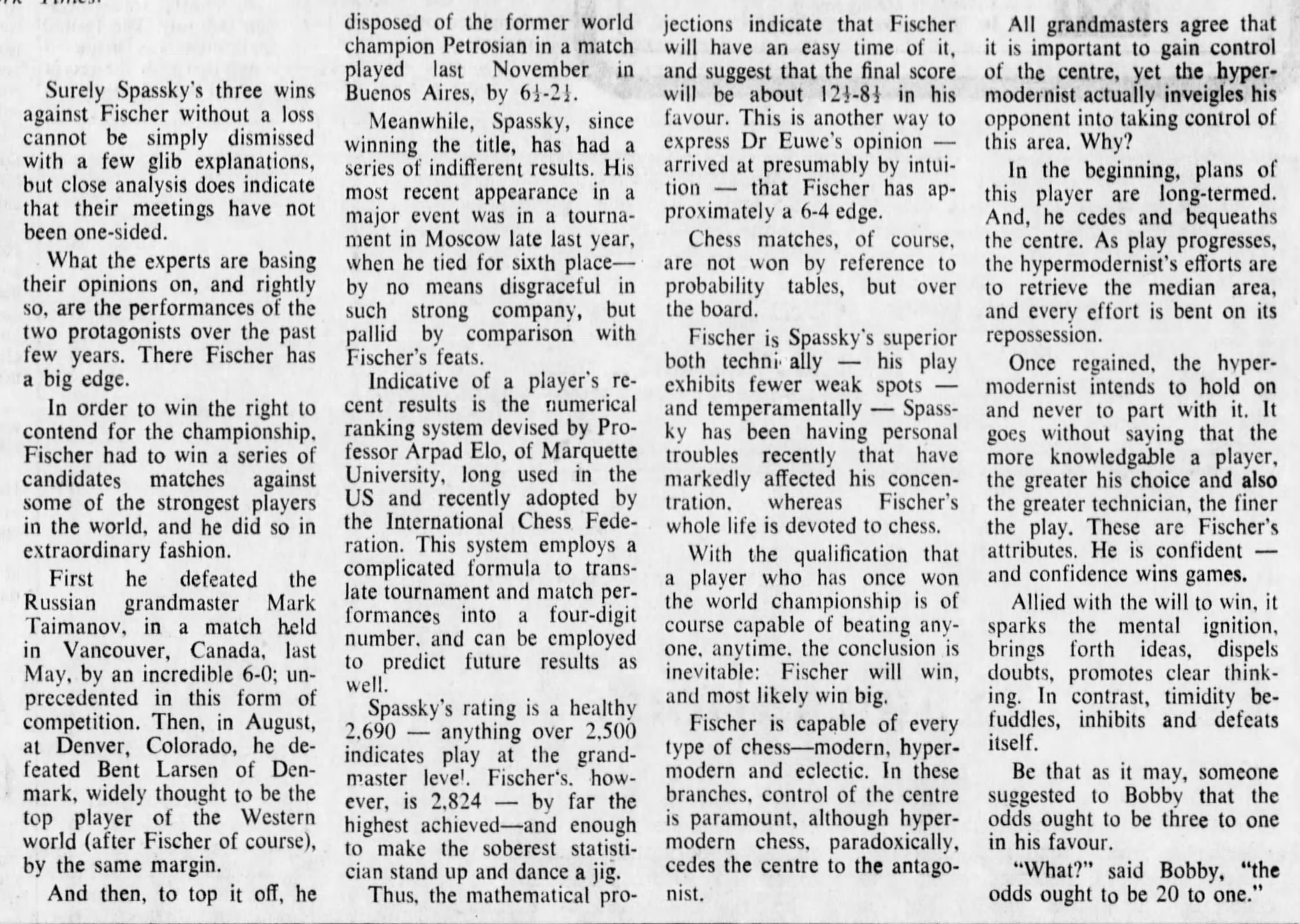 Bobby Fischer at the Summit 01 Jul 1972, Sat The Sydney Morning Herald (Sydney, New South Wales, Australia) Newspapers.com
Bobby Fischer at the Summit 01 Jul 1972, Sat The Sydney Morning Herald (Sydney, New South Wales, Australia) Newspapers.com
The Charlotte Observer Charlotte, North Carolina Saturday, July 01, 1972 - Page 14
Bobby Fischer's New Tactics?
Bobby Fischer is to chess what Muhammad Ali is to boxing and Joe Namath is to football. He is controversial, talented and unpredictable. Especially is he is unpredictable.
Mr. Fischer is scheduled to play a 24-game world championship match with the Soviet Union's Boris Spassky on Sunday in Reykjavik, Iceland. But as of Thursday he had not shown up. In chess terms, that is comparable to having Namath absent as the New York Jets go through their pre-game warmups at the Super Bowl.
Some say Mr. Fischer is only building up tension so he can assure a bigger gate. Others say he is still holding out in hopes that the Icelandic Chess Federation will agree to his demand for 30 per cent of the box office receipts.
The explanation we like the best is that Mr. Fischer is playing a war of nerves with Mr. Spassky and attempting to get an upper hand before play begins. Considering that Mr. Spassky has beaten the young American in five previous meetings, every little bit helps.
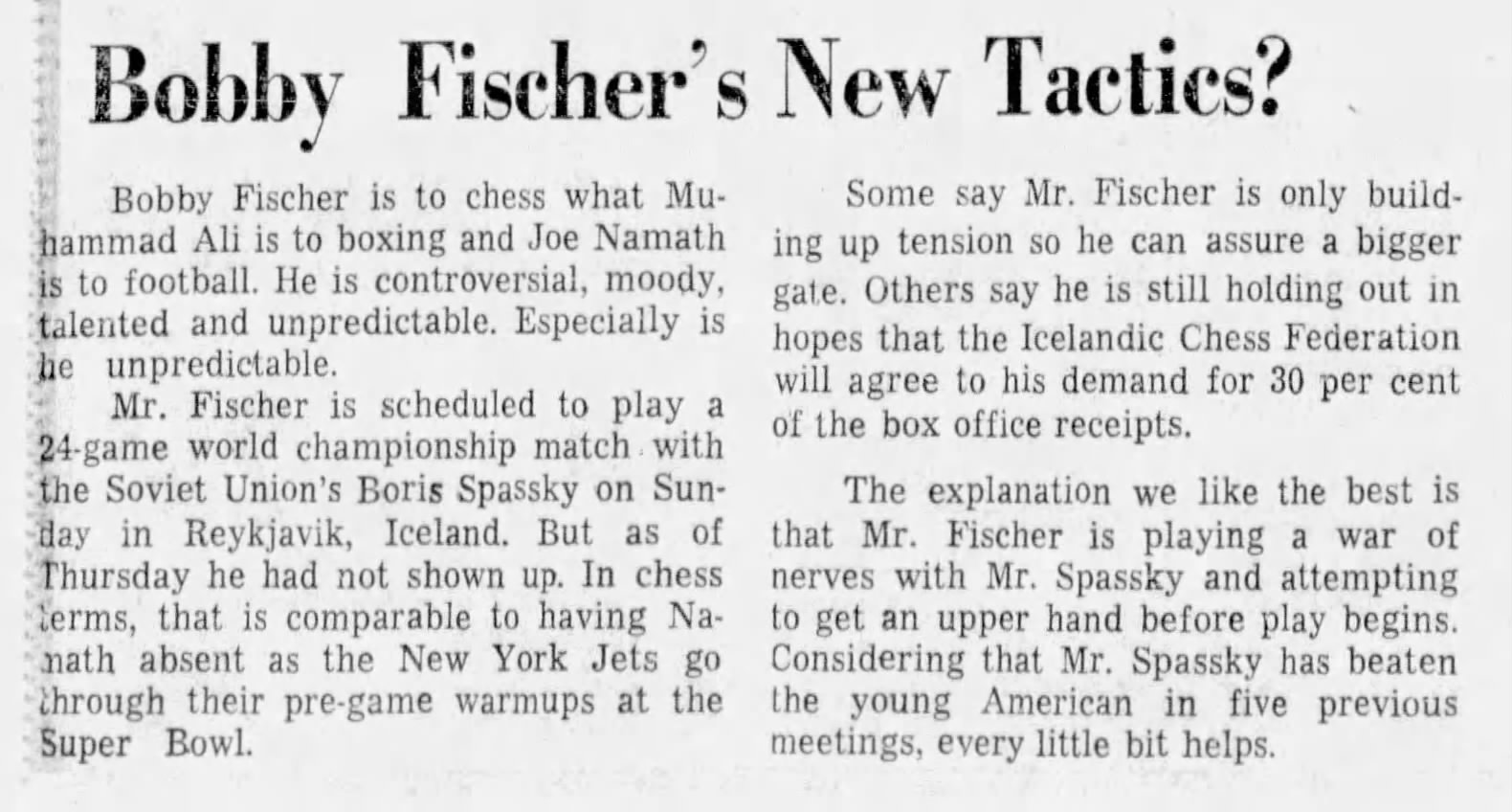 Bobby Fischer's New Tactics? 01 Jul 1972, Sat The Charlotte Observer (Charlotte, North Carolina) Newspapers.com
Bobby Fischer's New Tactics? 01 Jul 1972, Sat The Charlotte Observer (Charlotte, North Carolina) Newspapers.com
[Overlooked facts. It's wrongly assumed, Bobby Fischer was “afraid” of the World Chess Organizers, “blowing his opportunity” as some put it (as though he weren't fully aware of the consequences of what he was doing and would “regret” it), “trembling in fear” that he might not win the title. Fischer was in a state of mind to gamble and jerk their chains, for, as he tells Johnny Carson, November 08, 1972: “…this is really what kept me on. If they [Soviets] had just shut up, and ignored me and uh, you know and said I was a very fine player, I MIGHT NOT HAVE GONE FOR THE TITLE. It DIDN'T MATTER to me that much. I KNEW I WAS the best. But they kept saying this ALL THE TIME. Putting me down. Got me mad.”
Secondly, Fischer didn't care that much about the money, either. He turned around and gave it away to the Worldwide Church of God, and what wasn't given freely by Fischer, was pilfered by Church Lawyer, Stanley Rader.
Thirdly, these reporters have already forgotten that repetitively while Fischer was in training and silent throughout January-May 1972, with little or no “available comment” he did issue request for a percent of the gate receipts, but right after, the New York Times reported of a telegram Fischer sent to FIDE with clarification, he had every intention of playing and apologized if there were any misunderstanding. But that was only the beginning of the Belgrade and Reykjavik organizers spreading wild, baseless rumors. Not only did they fail to properly communicate with Fischer, they issued forth a flood rumors to blacken Fischer's reputation. Plots were underway to disqualify and replace Fischer with Petrosian. (That was no idle rumor by Ken Smith, as it was soon substantiated in newspaper reports from out of Europe). Even going so far as producing a “White Book” filled with accusations, but not a single authenticated telegram. GM Byrne reported on his review of the contents, and used terms such as “quoted Fischer as saying” and “allegedly said” which conveys to the reader, there was no actual evidence to substantiate a thing Belgrade organizers were claiming! According to their sordid rumors, supposedly, Bobby had allegedly stated he would not play Spassky “if” this, or “if” that … which had no truth to it. NOW, at the last minute, it appears Fischer is turning up the heat under those who deserved to get their hindquarters roasted … Fischer appears to be making good on those Belgrade-invented rumors. Bearing in mind what Fischer confided to Johnny Carson, November 08, 1972 … “I might not have gone for the title. It didn't matter to me that much.” Both the American press and the Soviets were projecting the Soviet's desperate graspings to monopolize the title, on to Fischer, whom in 1975, again, made good on his word to Carson. Fed up with Soviet antics, Fischer DID walk away … for two decades!]
The Orlando Sentinel Orlando, Florida Saturday, July 01, 1972 - Page 20
Iceland Says It Cannot Pay Fischer Any More
Reykjavik (Reuter) Iceland's Chess Federation announced Friday it could not pay 29-year-old American Bobby Fischer more money to play his challenge match here against Russian world champion Boris Spassky.
Federation Director Gudjon Ingi Stefansson was commenting on reports that the American has demanded 30 per cent of gate receipts for Sunday's match on top of an agreed share of a $125,000 purse.
UNDER THE existing arrangements, the winner of the match would receive five-eighths of the purse, and each player would also get 20 per cent of the film and television rights.
Stefansson said he had no idea why Fischer appeared to be delaying his flight to Iceland. Fischer reportedly booked a flight on one plane Wednesday and boarded another plane on Thursday, but he has not been seen in the Icelandic capital.
In any case, Stefansson added, even though Icelanders had the money for an extra payment, the rules of the contract prohibited the increased payment to guarantee Fischer's appearance.
IF ICELAND violated the contract by boosting Fischer's take Spassky could declare it void, Stefansson said. ([But why would Spassky do that? The Soviet Federation, however, would then seize upon the opportunity, having found its excuse to perpetuate their drama.])
When unconfirmed reports first circulated here last night that Fischer was refusing to play in the match unless he got the increase, Iceland's Chess Federation President Gudmunder Thorarinsson said “Fischer has accepted to come to Reykjavik and he is not the type of man to break his word.”
Fischer does not travel on a Saturday, the Jewish Sabbath, and officials here say he must arrive by tonight for the match to start on schedule.
TENSION was running high among Icelandic chess officials here Friday. Some people feared Fischer might not make the trip to Iceland at all.
Some chess fans here say Fischer may be reluctant to play here because Reykjavik was chosen as the match venue only after a long dispute.
The Orlando Sentinel Orlando, Florida Saturday, July 01, 1972 - Page 20
Tass Hits Fischer's Nerve War
Moscow (AP) The Soviet news agency Tass said Friday there is no certainty that the world championship chess match will be held at all and it blamed the situation on Bobby Fischer, the American who is challenging the Russian titleholder, Boris Spassky.
Tass commentator Allan Starodub noted reports that Fischer is asking for more money to play and waging “a war of nerves” by not yet showing up in Reykjavik, Iceland, for the 24-game match.
“OF COURSE it's his right to appear in Reykjavik just before the first match begins,” Starodub wrote, “but he should have warned the championships organizers in advance — otherwise his step can be regarded as disrespect toward them.”
Recalling that Fischer agreed to Reykjavik as the match site only “one hour before the deadline,” Starodub charged that the American grand master “now again tries to keep everyone in suspense.”
Noting that “unprecedented sums” were involved in the championship, the Tass writer contended there is a “disgusting spirit of gain that Fischer carries around with him.” ([… actually he gave all that money to a “public charity, classified by the IRS as a Section 501(c)(3) organization.”])
“IT IS characteristic that his spokesmen are lawyers and not chess players,” Starodub asserted. ([Unfortunate that Fischer wasn't given warning then, by “chess players” that he was falling into a trap devised by LAWYERS of the Soviet and Icelandic Chess Federations, who drew up said contract, with the fine print permitting a real life “checkmate” of Fischer in a future lawsuit by Chester Fox for 3.3 million. Trust?)]
“Wherever Fischer is, money ranks first, pushing aside all sporting motives.” ([Such as subsidizing players in the Soviet Union, to give them an unfair advantage?])
Starodub added that the drawing for the first move in Sunday's game is to take place Saturday. “So the right to make the first move in the match has not been decided yet but Robert Fischer has already made many ‘moves,’ true not on the chess board but on the business field.” ([True. Protecting himself from capricious Soviet “moves.”)]
STARODUB also complained that the Icelandic Chess Federation took the “unusual” step of selling all television and still picture rights for the championship. ([No. That decision was ordered direct from Moscow. Fischer was telling the press months earlier, the match would be staged in Iceland for the sole intent to censor the match. Purely the will of the Soviet, with Iceland acting the part as pawn.])
“Even the right to report the matches move-by-move action was sold,” he said. ([Of course, that was necessary to curtail coverage, and bury the match a desperate attempt to salvage Soviet prestige, and Fischer knew it.)]
“There has never been anything like this before,” Starodub declared. ([Yes there was starting with Lenin in 1918 shutting down rival newspapers, bringing the Russian people into a state of darkness and submission to his authoritarian regime, where all information is controlled by the State.)] “We guess that these strange conditions were made because Fischer demands more and more money.” ([This attempt to rationalize “why the blame” for Soviets CENSORSHIP should fall on the shoulders of Robert J. Fischer to burden . . . is an exercise in the futility of the use of ludicrously flawed logic.)]
The Baltimore Sun Baltimore, Maryland Saturday, July 01, 1972 - Page 3
Organizers Haggle With Fischer Over Fee As Chess Match Nears
Reykjavik, Iceland (AP)—Organizers of the world chess championship reported considerable progress last night in their negotiations with Bobby Fischer's lawyer over a last-minute demand for more money by the American challenger.
However, after an hour and a half session with Andrew Davis, Mr. Fischer's attorney, officials of the sponsoring Icelandic Chess Foundation said they had been given no assurance Mr. Fischer would appear for the beginning of the match tomorrow with Russia's Boris Spassky.
Compromise on Pay
A spokesman for the federation said he got the impression Mr. Davis was seeking a compromise in the dispute over the new financial conditions posed by Mr. Fischer.
Mr. Davis, Mr. Fischer's confidant as well as legal adviser, arrived here yesterday on a flight from New York that was to have carried the 29-year-old chess genius to the site of his 24-game match.
Mr. Fischer had reserved space on the plane and checked his luggage on before he changed his mind. He suddenly called for his bags from the aircraft and disappeared from New York's Kennedy Airport after holding up the flight for more than two hours.
What Mr. Davis and officials of the Icelandic Chess Federation had to sort out was a fresh demand by Mr. Fischer for 30 per cent of the gate receipts collected during the match.
Without the extra money, he threatened to boycott the match, which was scheduled to begin tomorrow.
It was learned that Gudmunder Thorarinsson, the federation president, spent most of the night in sometimes-heated telephone conversation with Mr. Fischer's representatives in the United States.
A Moscow dispatch indicated Russian concern over developments. A Tass writer claimed Mr. Fischer was disrespectful to the organizers ([and who threw the first punch?]) and was placing the value of money over that of the sport of chess. {[and,who is it that places the value of monopolizing titles by means of unfairly subdizing their players, at the expense of disadvantaging competitors in other countries? So much for fair play and good sportsmanship.])
In match preparations, which have already caused a lot of frayed nerves, one additional problem was that Mr. Davis carried no written authorization from Mr. Fischer to act on his behalf.
But federation officials were hopeful at least that hurdle could be passed.
Once Mr. Fischer earned the right to challenge Mr. Spassky, after eliminating a series of strong opponents in the challenge round, plans began to go awry for the “match of the century.” ([That is so, because “old hands” in Reykjavik/Belgrade were seeking to find an excuse to disqualify and then replace Fischer with Petrosian.]).
There have been disputes over money ([and why shouldn't there be? Australia offered “…$200,000 of the $225,000 would go towards prize money, with the remaining $25,000 for expenses,” whilst Mexico bid totalled 175 grand, but the Soviet would like to cover all that up, making a payoff of peanuts, along with complete censorship, knowing the illusion of the Soviet Ubermensch is soon to be shattered on the world stage)], the site, lighting conditions, housing and even the kind of car the host federation should provide for Mr. Fischer. [And why not? When they had refused for months, as Col. Ed Edmonson asked them to do, to sit down and work out the arrangements with Fischer man-to-man. The Soviets even forbid Spassky to travel for it, when Spassky argued it was necassary that he should meet Fischer in person at the Amsterdam conference in January 1972. The organizers failed to work out the details in a timely manner, hence, this needless delay.]
Corvallis Gazette-Times Corvallis, Oregon Saturday, July 01, 1972 - Page 18
Money Conflict
Andrew Davis, second from left, attorney for United States chess star Bobby Fischer, speaks with Chester Fox, after Fox met Davis at Keflavik Airport outside of Reykjavik, Iceland, Friday. Davis arrived in Iceland from New York on a flight that was to have carried Fischer to the world chess championships set to begin Sunday with Russian Boris Spassky. Organizers of the event now say that the whole match depends on eleventh hour negotiations between them and Fischer's lawyer on a new demand for more money. (AP)
The Sydney Morning Herald Sydney, New South Wales, Australia Saturday, July 01, 1972 - Page 1
Bobby Fischer Fails to Leave U.S.
New York, Friday. — An Icelandic Airlines flight to Reykjavik, Iceland, scene of the world championship chess match set for Sunday, left New York early today without the American challenger, Bobby Fischer aboard.
Fischer, whose unpredictable behaviour has frayed nerves in official chess circles, was seen at the airport late last night. While a bodyguard blocked a photographer, Fischer hurried from the building, ran across a car park, and disappeared.
He was expected in Reykjavik days ago, but several times canceled plane reservations.
In Amsterdam, the president of the World Chess Federation, Dr. Max Euwe, said yesterday that Fischer could lose his rights to play for the world title “not only this time but perhaps forever” if he failed to show up. (The match begins at 2 a.m. Monday, Sydney time.)
Almost overlooked as the Fischer drama unfolds, world titleholder Boris Spassky of the Soviet Union is waiting and ready in Reykjavik.
Waiting also in Reykjavik is a $A53-a-day hotel suite, and, if Fischer wants them, the loan of a $42,000 house, the hotel chess, the best automatic transmission car on the island, and a refrigerator full of apple juice, yoghurt, ginger ale and bananas.
The Palm Beach Post West Palm Beach, Florida Saturday, July 01, 1972 - Page 14
Superbowl of Chess
For the past several months 29-year-old Bobby Fischer has been spending about eight hours a day in rigorous physical exercise and another eight hours in deep mental concentration. Yet, unfortunately, few Americans are aware of the two-man superbowl he has been training for.
There won't be any pretty cheerleaders or live TV coverage when Bobby Fischer and Boris Spassky face off over a chess board Sunday. In the United States chess ranks just a cut above Scrabble as a quiet pastime.
But the young American challenger certainly deserves a good measure of support from this country. He is beginning a 24-game series for the world championship against a Russian grandmaster who counts chess as his national sport.
The Soviets have dominated the ancient game throughout this century, while the United States has never had a player who could even reach the finals. Bobby Fischer has not only earned the right to play the Soviet Union's champ but has done it all alone with little financial or moral backing. This title match has been his goal since he became the U.S. champion at age 14.
It will take 12 and a half grueling wins to beat Boris Spassky. The pressure of tournament play requires physical stamina and mental alertness that exceeds the performance many Americans admire so much in champion athletes.
Bobby Fischer may be playing on “neutral” territory in Iceland, but the Russian spectators undoubtedly will outnumber the Americans. That is an advantage U.S. citizens ought to make up in well-wishes for the challenger.
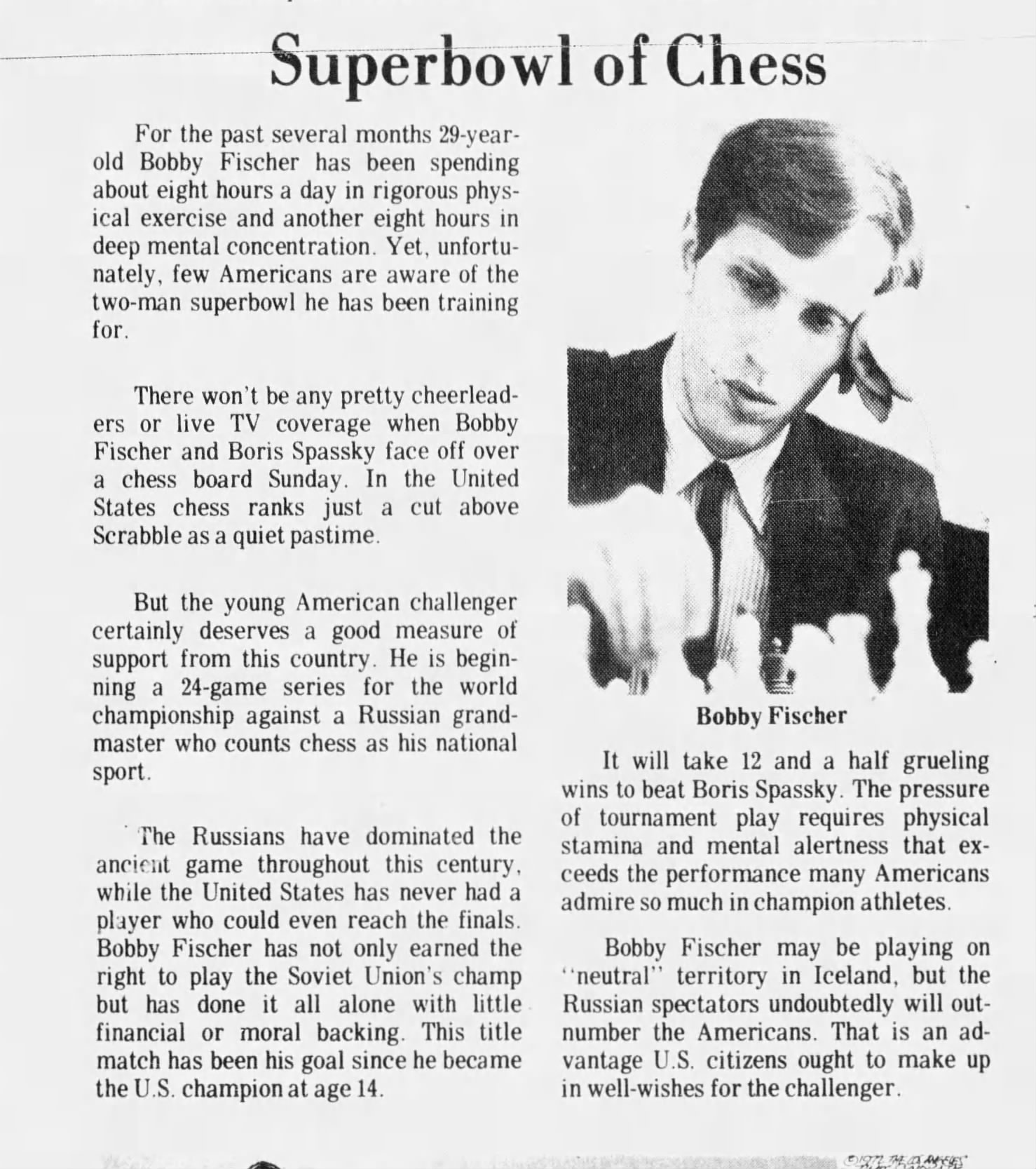 Superbowl of Chess 01 Jul 1972, Sat The Palm Beach Post (West Palm Beach, Florida) Newspapers.com
Superbowl of Chess 01 Jul 1972, Sat The Palm Beach Post (West Palm Beach, Florida) Newspapers.com
Florida Today Cocoa, Florida Saturday, July 01, 1972 - Page 4A
Bobby Makes His Move
Can a lone American successfully challenge a product of the Soviet Union's time-tested chess machine?
Can a perfection-seeking genius keep his cool through the grind of a 24-game championship series?
Can Bobby Fischer, America's challenger, end a 25-year reign for the U.S.S.R. as world chess champions?
We'll start getting the answers Sunday when Fischer — Brooklyn's now-grown-up child prodigy — faces world champ Boris Spassky across the 64-square board.
The championship match has attracted widespread interest in this nation, which has tended to regard chess as a dull, slow, sedentary game that intellectuals play.
Aficionados know better. It's a game that demands great physical stamina as well as superior concentration when played at the international grandmaster level. Bobby's youth was credited in part with his victory in the challenge round over the Soviet's former world champ, Tigran Petrosian. At 43, the one-time Russian “tiger” is over the hill.
Bobby's lopsided victories in the preliminaries have excited great interest in this nation, with a parallel rise in chess set sales.
Bobby — who trains as strenuously as any athlete (mainly bowling, swimming and table tennis) — has indirectly led many Americans to the game of chess. They have discovered that the game not only is interesting and challenging, but just plain fun.
For Fischer and Spassky, the match promises to be a grueling challenge.
If we were a gambling man, our money would have to go on Bobby.
It's your move, Boris …
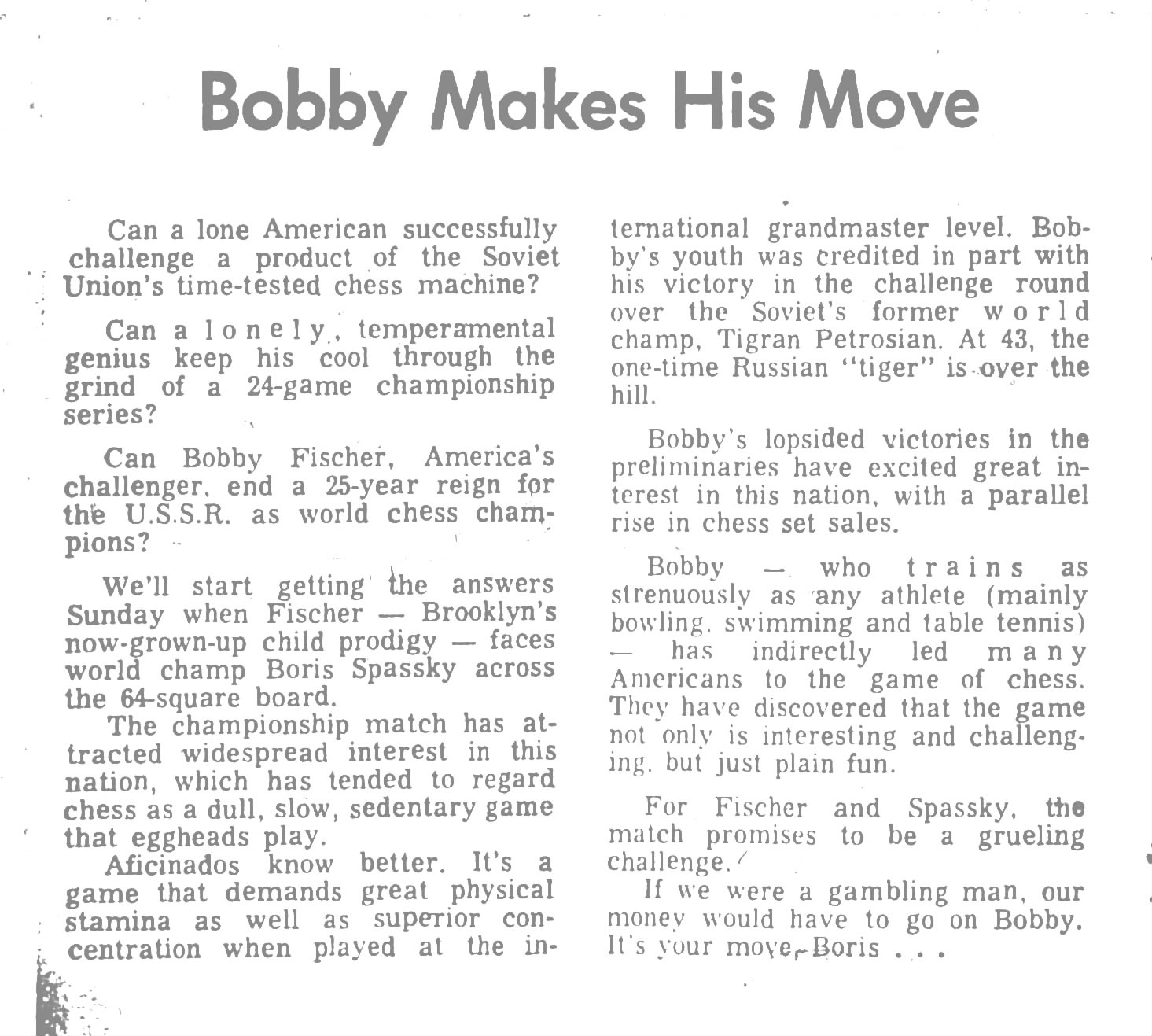 Bobby Makes His Move 01 Jul 1972, Sat Florida Today (Cocoa, Florida) Newspapers.com
Bobby Makes His Move 01 Jul 1972, Sat Florida Today (Cocoa, Florida) Newspapers.com
Springfield Leader and Press Springfield, Missouri Saturday, July 01, 1972 - Page 7
This is the chess board on which Bobby Fischer of the United States is scheduled to play defending Soviet champion Boris Spassky, beginning Monday. But there was no guarantee today that Fischer would show up in Reykjavik, Iceland, for the match.
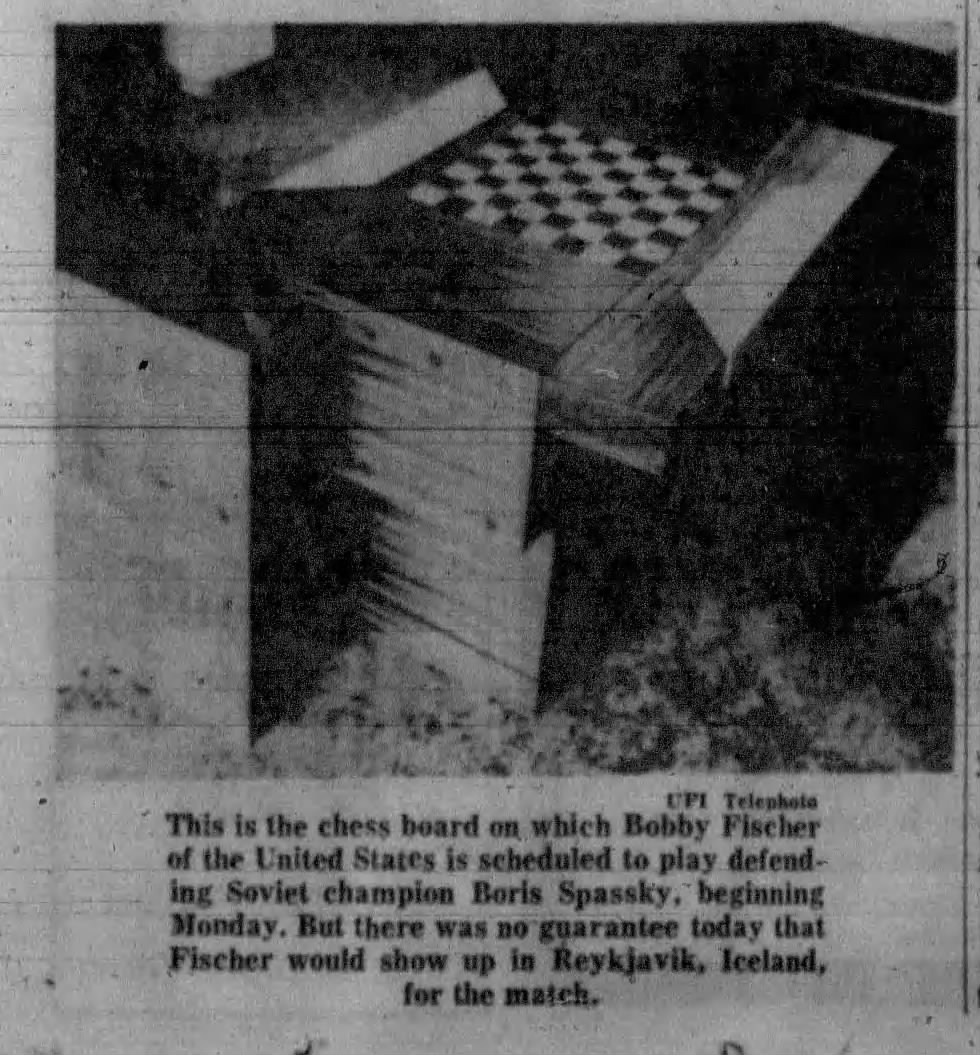 Chess Board 01 Jul 1972, Sat Springfield Leader and Press (Springfield, Missouri) Newspapers.com
Chess Board 01 Jul 1972, Sat Springfield Leader and Press (Springfield, Missouri) Newspapers.com




















